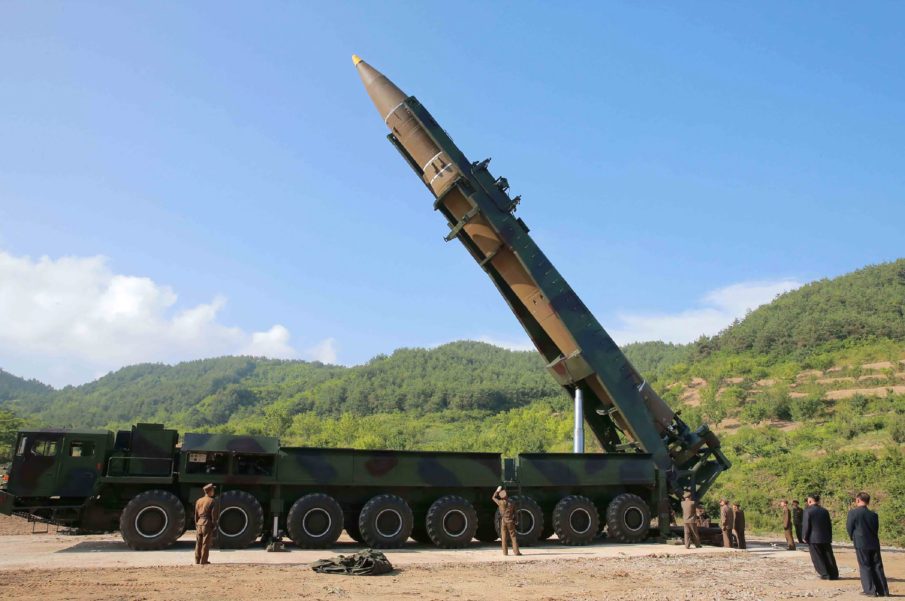Russia’s Foreign Minister, Igor Morgulov, met with his South Korean counterpart in Seoul on Monday, where he warned that the situation with North Korea could grow to become “apocalyptic,” because of American influence. The top Russian diplomat also seemed to take credit for the recent lull in North Korean ballistic missile tests.
“We greatly value that North Korea preserves the regime of silence for two months already, and Russia actively works to make sure that the current regime continues as long as possible,” Morgulov said, going on to claim that he believes it must be the result of the “freeze for freeze” roadmap championed by China, though Morgulov was happy to share in the credit on behalf of his nation as well.
“I think North Korea’s restraint for the past two months is within the simultaneous freeze road map.”
At that point, he directed his rhetoric toward South Korea and its primary military ally, the United States, accusing the two nations of preventing progress through their military drills. Although North Korea has claimed on multiple occasions that they refuse to participate in diplomatic talks with the U.S. until they have confirmed their ability to strike the East Coast with long-range nuclear missiles, Morgulov claimed it was America that has prevented a de-escalation of tensions in the region.
“If Pyongyang’s demonstrated restraint over the past two months was met with similar reciprocal steps on behalf of the United States and its allies, then we could have moved to the start of direct talks between the United States and North Korea,” Morgulov said.
These statements, of course, are based on the supposition that North Korea, for some reason, has chosen to honor the concept of a mutual freeze of hostile actions without acknowledging the intent to do so publicly. It would seem that Russia’s Foreign Ministry would prefer to make assumptions about the foreign policy of Kim’s regime, rather than asking them directly.
Data first compiled and reported by the Washington Post would indicate a different reason for the recent lull in North Korean ballistic missile tests: the harvest season. North Korea has historically struggled with food production within the nation. Because they are unable to import fertilizer, the nation relies on recycled human waste to aid in food production, an inefficient method that lends itself to widespread parasitic infections like those seen in the soldier who defected into South Korea on November 13th. His stomach housed little more than hardened corn kernels and massive parasites, some measuring up to 11 inches in length, indicating a lack of abundant food sources and the general condition of the food that is available.
Since Kim Jong Un took power in 2011, North Korea has seen a massive increase in ballistic missile tests, though those tests die down in the fourth quarter every year. In fact, since the youngest Kim took power, there have only been five total ballistic missile tests conducted in the final three months of the year; the period that coincides with the harvest season.
The recent influx of North Korean fishermen dying or becoming stranded in the waters off the coast of Japan supports the idea that, under the current climate of international sanctions, North Korea is growing increasingly desperate for external sources of funding and food. Fishermen likely wouldn’t risk crossing the turbulent Sea of Japan in six foot wooden vessels otherwise, nor would a border guard, traditionally the most well-fed of Kim’s troops, be so near starving.
In effect, Russia hoped to publicly take credit for the domestic emphasis North Korea has likely placed on its harvest season, which has only grown in importance since American and UN sanctions have limited the nation’s ability to conduct normal operations.
These remarks from the head Russian statesman may not be a valid representation of reality, but they are in keeping with the recent shift in Russian, Chinese, and North Korea rhetoric that aims to paint America as the transgressor on the Korean Peninsula. Years of threats of pre-emptive nuclear strikes have been forgotten by each of these three nations, as they suggest the heightening tensions are the result of Kim and President Trump butting heads, rather than the rapid development of Kim’s ballistic missile and nuclear arsenals.
Already have an account? Sign In
Two ways to continue to read this article.
Subscribe
$1.99
every 4 weeks
- Unlimited access to all articles
- Support independent journalism
- Ad-free reading experience
Subscribe Now
Recurring Monthly. Cancel Anytime.










COMMENTS